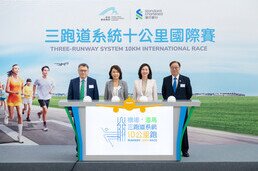
Airbus, Kansai Airports, Kawasaki Heavy Industries to Accelerate Readiness of Hydrogen Aircraft Operations in Japan
- 2024-10-17
@Airbus @kansai_airports @Kawasaki #hydrogen #decarbonisation #sustainability
Airbus, Kansai Airports, and Kawasaki Heavy Industries (Kawasaki) have signed a Memorandum of Understanding (MoU) to study the feasibility of hydrogen infrastructure at three airports operated in the Kansai region - Kansai International Airport, Osaka International Airport, and Kobe Airport.
With this MoU, the three parties will conduct an initial feasibility study for the introduction and operation of hydrogen aircraft as part of the “Hydrogen Hub at Airports” programme* and strengthen collaboration to materialise the supply of hydrogen to aircraft at the three airports.
The new initiative by the three parties will focus on the definition of a hydrogen infrastructure and supply roadmap at all three airports.
The results will be evaluated from the perspectives of technology, economics, legal compatibility and operations. The approach to the challenges identified will be clarified through potential demonstration projects to be launched.
Since 2022, Airbus has worked with Kansai Airports on the use of hydrogen in the development of airport infrastructure, where Kansai Airports demonstrated world class hydrogen have their own geographical and traffic characteristics which allowed Airbus to study multiple means to supply hydrogen into the airport premises.
The manufacturer and Kawasaki have also worked for the joint study of the hydrogen-fuelled ecosystem, where Kawasaki, as a leading hydrogen solution provider, demonstrated strong capabilities to design several end-to-end liquified hydrogen supply network options. Kawasaki has experience in the installation of baggage handling systems, and has knowledge of airport infrastructure development.
Both studies have delivered solid understanding about hydrogen infrastructures at the airports and the successful partnerships evolve into the second phase of the integrated feasibility study. Collaboration between the three parties enables more feasible studies that incorporate the perspectives of both supply chain and airport operations
Under the partnership, Airbus carried out a liquified hydrogen demand forecast for the airports where a few tons of liquified hydrogen per day would be required to support the aircraft operations in the early stage of introduction. It is forecasted to increase towards up to several hundreds tons per day around 2050. Airbus has observed a mature hydrogen industry footprint in Kansai and other regions backed by extensive policy measures and foresees a promising market for hydrogen aviation. “Hydrogen is attracting global attention as a way to decarbonise. The Japanese Government is promoting a hydrogen-based energy strategy to achieve its carbon neutrality target by 2050,” said Karine Guenan, Head of ZEROe Ecosystem. “In fact, the Japanese Government has announced specific plans for the development of hydrogen from production to consumption. We believe our partnership with Japanese companies under the Hydrogen Hubs at Airports programme will contribute to the introduction of a hydrogen-powered aircraft by 2035.” “Kansai Airports has set a vision to achieve net-zero greenhouse gas emissions by 2050 and is actively pursuing various initiatives, including the use of hydrogen, to reduce environmental impact,” said Mathieu Boutitie, Executive Vice President and Chief Technical Officer of Kansai Airports. “We are delighted that this partnership will not only help us crystallise hydrogen solutions in the airport sector but also contribute to the decarbonization in the aviation industry. Following our efforts with Airbus since 2022, we welcome Kawasaki in our collaboration and strive to become a model for hydrogen use in airport infrastructure.” “Kawasaki has been developing all sorts of technologies required for establishing an international hydrogen supply chain, after recognizing early on the value of hydrogen as a ‘clean’ energy carrier which emits no CO2 when used,” said Shigeru Yamamoto, Executive Officer and General Manager of Hydrogen Strategy Division, Kawasaki. “We believe that this three-company partnership will be a step towards a solution for decarbonization through the use of hydrogen in the aviation industry, where a reduction in CO2 emissions has been deemed difficult. The signing of this memorandum of agreement is sure to accelerate Kawasaki’s efforts to develop the infrastructure which enables the operation of a hydrogenpowered aircraft.” Airbus, Kansai Airports and Kawasaki will contribute to the realisation of a society in which hydrogen aircraft can operate in the future. The use of hydrogen to power future aircraft is not only expected to significantly reduce aircraft emissions in the air, but could also help decarbonise air transport activities on the ground. In 2020, Airbus unveiled the first ZEROe concepts with the ambition to bring to market the world's first hydrogen-powered commercial aircraft by 2035. The development of the corresponding technology bricks is now underway in a global Research & Technology network
*Airbus launched the “Hydrogen Hub at Airports” programme to jumpstart research into infrastructure requirements and low-carbon airport operations, across the entire value chain.
To date agreements have been announced with partners and airports in 14 countries including Japan, France, Germany, Italy, U.S.A., Canada, New Zealand, Norway, Singapore, South Korea, Spain, Australia, Sweden and the United Kingdom.







